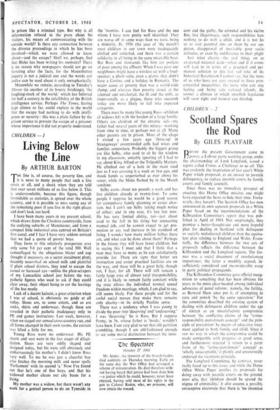Scotland Spares the Rod
CHILDREN — 2 By GILES PLAYFAIR EFORE the present Government came to D power, a Labour party working group, under the chairmanship of Lord Longford, issued a report called Crime, a Challenge to us all. This was evidently the inspiration of last year's White Paper which proposed, as an answer to juvenile delinquency, to replace juvenile courts by family courts and family councils.
Since there was no immediate prospect of enacting this Home Office missive, one might have expected the Scots to bide their time. Fortu- nately, they haven't. The Scottish Office has now announced its own separate proposals in a White Paper based on the recommendations of the Kilbrandon Committee's report that was pub- lished in April of 1964. Not surprisingly, they promise a better-thought-out and more hopeful plan for dealing in Scotland with delinquent or socially maladjusted children than the equiva- lent plan relating to England and Wales. Essen- tially, the difference between the two sets of proposals reflects the difference between the Kilbrandon and the Longford reports. The for- mer was a social document of revolutionary importance; the latter a muddily argued, in- sufficiently considered and inconsiderable essay in party political propaganda.
The Kilbrandon Committee gave official recog- nition to something that has been obvious for years to the mbre clear-headed among individual advocates of penal reform : namely, the futility, as Bernard Shaw once put it, of attempting to cure and punish `by the same operation.' For the committee described the existing system of dealing with delinquent children under the age of sixteen as an unsatisfactory compromise between 'the conflictine claims of the "crime- responsibility-punishment concept" and the prin- ciple of prevention' by means of educative treat- ment applied to both family and child. Since it saw no way in which the compromise could be made compatible with progress or good sense, and furthermore rejected 'a return to a purer form of the "crime-punishment" concept' as `wholly unacceptable,' it plainly and unreservedly endorsed the treatment principle.
The Longford Committee, by contrast, never really faced up to this issue: and while the Home Office White Paper justifies its proposals for doing away with juvenile courts on the ground, inter alia, that 'children should be spared the stigma of criminality,' it also assures a possibly unreceptive electorate that there is 'no intention to deal lightly with young offenders—quite the contrary.' If that means anything—and, of course, it may not—it says that family councils and family courts will • be used to deal more punitively with young offenders than the juvenile courts have been able to do.
This explicit rejection of the Kilbrandon premise is implicit in a number of the detailed proposals. Thus one so-called 'method of treat- ment' is to be 'short-term training of the kind now provided in junior detention centres'; or, in less euphemistic language, a sentence to what is notoriously and designedly the most purely punitive type of all modern penal institutions. Moreover, the child is to have no right of appeal to the family court against such a sentence or, for that matter, against any other order of the family council, if his parents can be persuaded to agree to it. The result will be worse than a palpable betrayal of 'sparing children from the stigma of criminality.' It will exacerbate the one thing that is generally agreed to be a cause of Juvenile delinquency—an emotionally insecure home life. A child can hardly be expected to love his parents more, or to feel less deprived of their love, if in his mind they conspire with authority to have him sent away for the imper- sonal administration of a 'short, sharp shock.'
All this makes the Scottish proposals, which are uncompromisingly loyal to a clearly defined purpose, seem the more admirable Instead of the cumbersome arrangement of family councils and courts, there are to be children's panels composed of lay people with experience in deal- ing with children. An official attached to each panel will have the sole right of bringing cases before it; and he will only do so when they cannot be disposed of more simply through, say, the child and his parents voluntarily agreeing to supervision from a social worker. While a panel will require the parents as well as the child to attend its hearings, any decision it reaches will not necessarily be final because the parents are persuaded to accept it. The child will still have his own right of appeal to the sheriff's court.
More importantly, custody as a punishment is to be specifically abolished. In short, the pro- posals mean that in Scotland, subject only to the Crown's right to prosecute offences of ex- ceptional gravity, treatment measures, exclu- sively, are to be employed against child delinquency; deterrent penalties, such as a sen- tence to a detention centre or even the imposition of a fine, are to be entirely dispensed with.
The plan is not above criticism. Valid objec- tion may be made to it in principle on the ground, for example, that an appearance in a court of law seems in itself to be an effective method of dealing with many delinquent children, and ought not, therefore, to be lightly cast aside. In practice, too, one may question whether it will be possible to recruit enough lay people with the necessary quality of mind to make the work of the panels genuinely non-punitive in intent and effect. Though the Secretary of State for Scotland, at a press conference last week, was sanguine about this, one still wondered when a ponderous leader in The Times next day found it 'curious' that the panels were not to be em- powered to impose fines!
Still, whatever may be said against the plan, it represents a genuinely new approach towards the problem of child delinquency: an approach unfettered by the usual illogicalities and incon- sistencies of penal policy. As such, it puts Scotland one first and vitally important step ahead of England in meeting the challenge of juvenile crime.







































 Previous page
Previous page